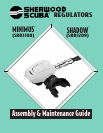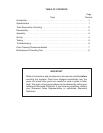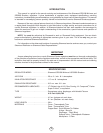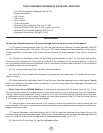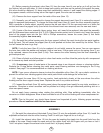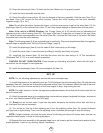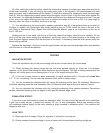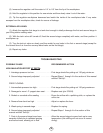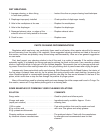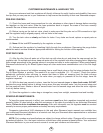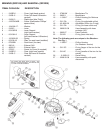
CUSTOMER MAINTENANCE & HANDLING TIPS
How your customers treat their regulators will directly influence the unit's function and durability. Here are a
few tips that you can pass on to your customers to help ensure the durability of their new Sherwood octopus:
PRE-DIVE CHECKS:
(1) Check the hoses and hose connections for cuts, abrasions or other signs of damage before mounting
the regulator on the tank valve. Slide the hose protectors back to inspect the areas of the hose normally
covered. Be sure all hose connections are tight.
(2) Before turning on the tank air valve, check to make sure that the yoke nut or DIN connection is tight
and the regulator body is aligned properly, with no kinks in the hoses.
(3) Turn the tank valve on
slowly and listen for leaks. If any leaks are found, replace or repair parts as
recommended.
(4)
Never lift the tank/BCD assembly by the regulator or hoses.
(5) Surface-test the regulator by breathing lightly through the mouthpiece. Depressing the purge button
above the water's surface is
not an appropriate method for testing the function of the regulator.
POST-DIVE CARE:
(1) After the dive, blow all water out of the dust cap with clean dry air and place the cap securely on the
regulator inlet. On multiple tank dives, keep salt water out of the regulator inlet when changing tanks. Neglecting
these simple procedures is the greatest cause of corrosion and wear in scuba regulators. When used properly,
Sherwood's exclusive Dry Air Bleed System keeps all other water-borne contamination out of the first stage
body.
NOTE: A tiny stream of air bubbles escaping from a small black valve on the first stage indicates that the
Dry Air Bleed System is working. The amount of air used is negligible (13 - 27 cc/min.). Check the system
periodically, particularly after servicing, to ensure that there is some air escaping from the black one-way
bleed valve. If no air is escaping from the valve when you apply air pressure to the first stage, have the
regulator inspected.
(2) With the dust cap securely in place, rinse the first and second stages in
clean fresh water. DO NOT
depress the purge button before or during rinsing since this may introduce water 'into the second stage and
the low pressure hose. Shake or blow all excess water from the second stage and allow the entire regulator
to air-dry before storing.
(3) Store the regulator in a clean bag or storage box, away from sunlight, excessive heat and humidity.
SCHEDULED MAINTENANCE:
To keep the owner warranty in effect, your customers must have their regulators inspected and serviced
annually (within 30 days before or after the anniversary of the date of purchase) by an authorized Sherwood
Dealer.
Failure to do so invalidates the warranty. Even with infrequent use, the regulator must be serviced
annually to ensure proper performance and satisfy warranty requirements.
Companion instructional VHS videotapes to this and other Sherwood repair manuals are available from
your authorized Sherwood distributor at a nominal cost. Ask your Sherwood sales representative or authorized
Sherwood distributor for details.
NOTE: Part numbers and specifications are subject to change without notice. Changes will be announced
by technical bulletins. You, the repair technician, should have ready access to these bulletins. Your authorized
Sherwood distributor is your most current source of correct part numbers and information.
8



